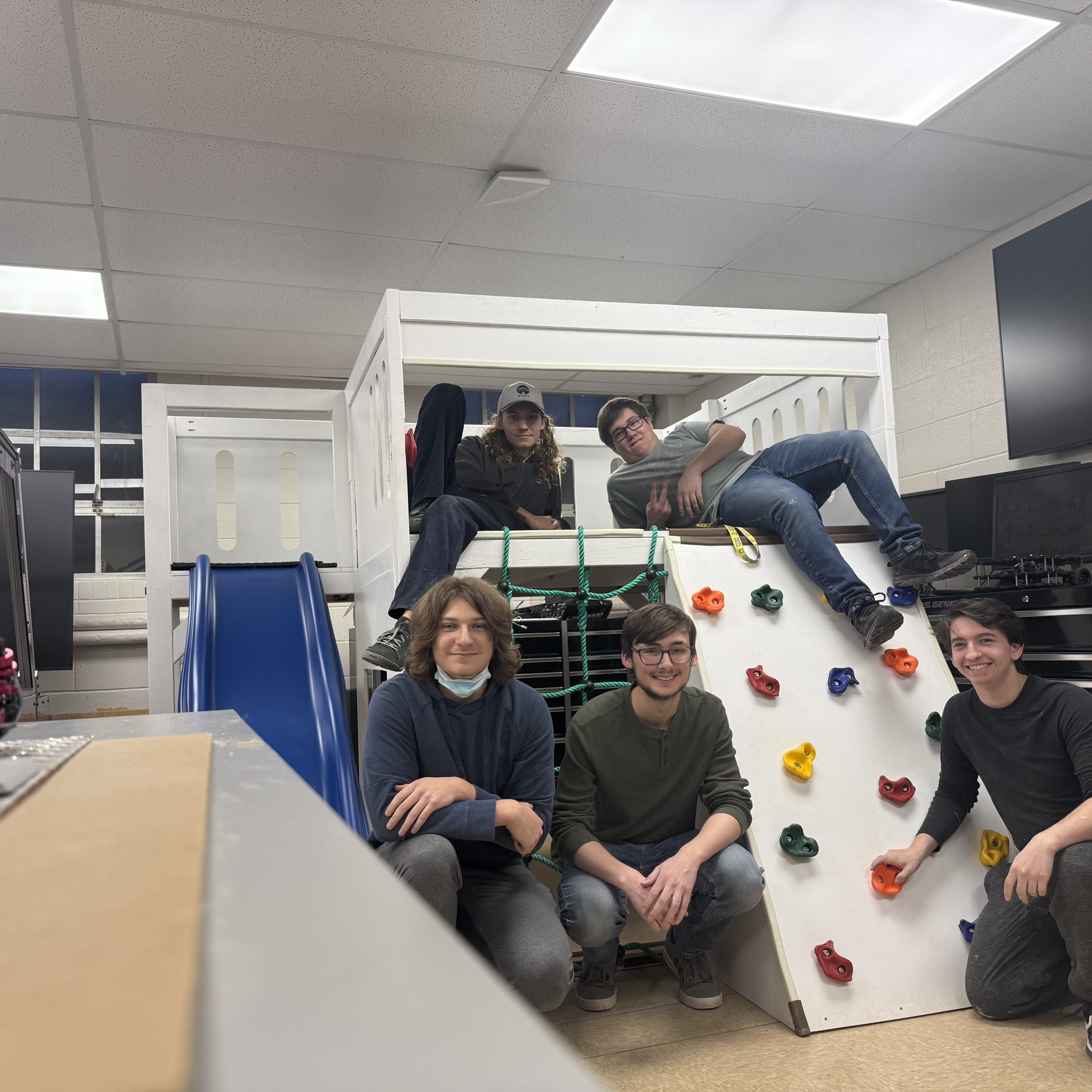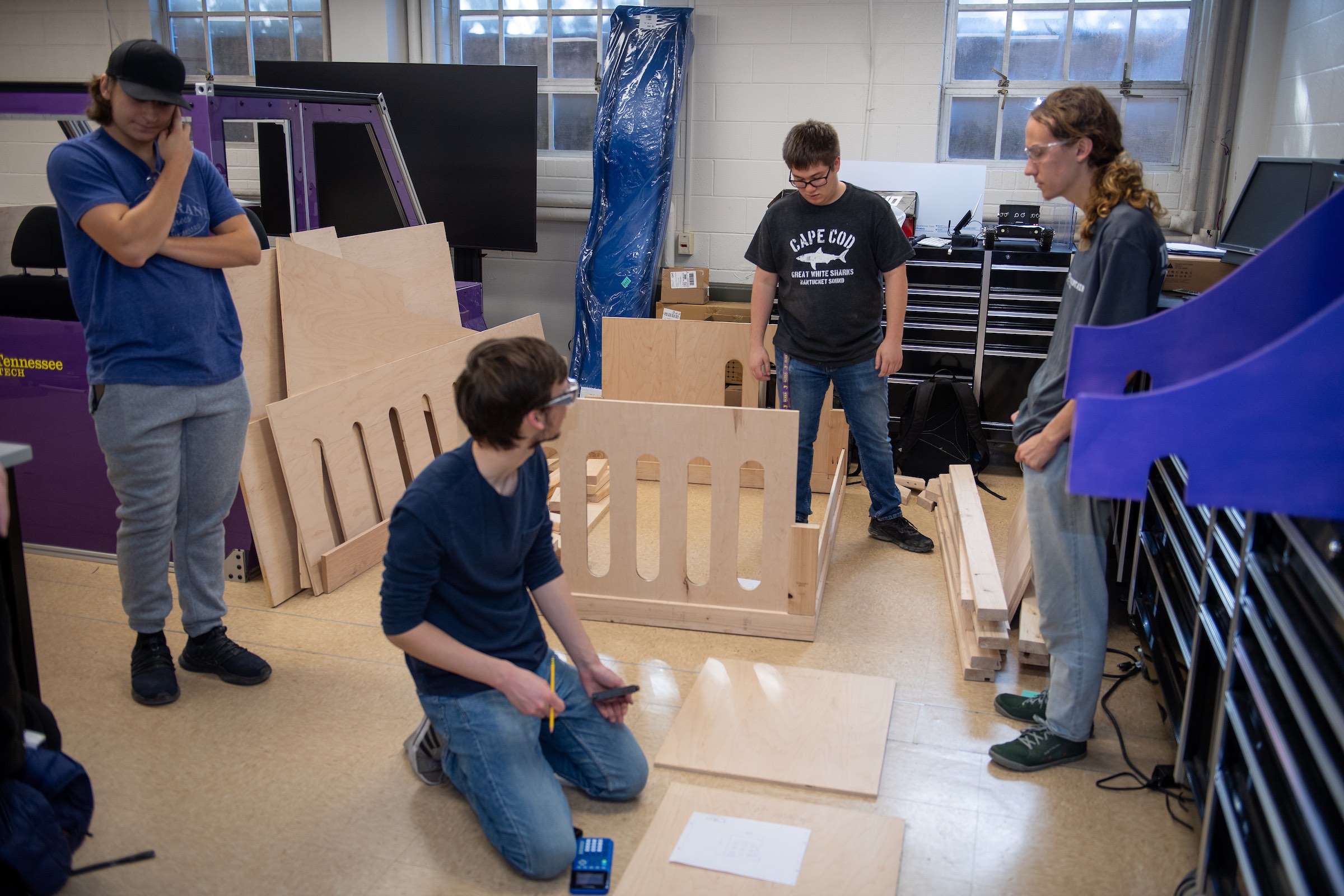Tennessee Tech engineering students build indoor playground for Wilson County child with special needs

Some of the Tech Engineering for Kids team members take a moment to enjoy their effort
of designing, building and painting a climbing play set before delivering it to a
Wilson County child with autism. The students on the bottom, from left, are Frederick
Heerdt, Sean Borchers and Joshua Matson, while on top of the platform, from left,
Aiden Bull and Carter Birdwell survey their results.
“Thank you are the two most important words I can say.”
Jessica Kleveno’s gratitude is for a Tennessee Tech University engineering project
that provided her 4-year-old son, John, recently diagnosed with autism, with a specially
designed, one-of-a-kind indoor climbing playground.
Tech Engineering for Kids (TEK) is a course that matches a child with special needs
to a team of Tech engineering students in Stephen Canfield’s Dynamics of Machinery
course for mechanical engineering. The team working on John’s play equipment this
semester said the project taught them the importance of flexibility.
“It was exciting to do because it allowed us to work as a team and troubleshoot problems
together as a team,” said Kevin Molina, a Tech engineering student from Madison, Tenn.
“We learned new skills and made a positive impact on a child and family.”
Teammate Sean Borchers, from Lascassas, Tenn., agreed, saying, “In many previous engineering
projects, the work that I’ve done has been for myself, whether it be for getting a
good grade or learning a skill to apply to my career. However, this project brought
a new perspective to my work, seeing that what the team produced would directly impact
the lives of others.”
Canfield said the entire process of a design-build-deliver project is an important
lesson for young engineers.
“It often requires giving a lot more time and energy than originally expected,” he
said. “This was particularly true for my team building the climbing-wall-themed playground.”
The student team working on the project had to make modifications of their design
part-way through the process. Initially designed as portable play equipment, the plan
shifted to a permanent installation after the family moved into a bigger home.
“They had to reperform their calculations to make sure the structure was strong and
suitable and follow through to ensure a high-quality build. The final result is terrific,
and I’m confident it will be helpful to the child and family,” Canfield said.
Team member Aiden Bull, from Knoxville, said he was so pleased with the result that
he wanted one at his house.
John clearly gives his vote of confidence with his actions, making a circuit: choosing
the rock or rope-ladder climbing wall, running across a platform and sliding down
an attached slide at the opposite end, giggling and shrieking with delight the entire
time.
Sometimes, the lighted buttons of a circuit board on the platform catch his interest,
and other times, he prefers to swing from a set of monkey bars attached to the bottom
of the platform.
At the end of the semester, when the Tech students delivered their project to the
family’s Wilson County home, Jessica said John stood by enthusiastically wringing
his hands and saying, “I’m so excited!”
“Waiting isn’t easy for him,” she continued.
John exhibits various characteristics typical of a child with autism. However, his
mother says she has seen his symptoms improve since working with a home-visiting behavioral
therapist in a Tennessee Early Intervention program. He was late picking up speech
and still has a limited vocabulary; he has to practice regulating his impulse control
and emotional reactions; and, in his case specifically, he has a keen interest in
climbing.
“He loves to climb, and he has no fear of heights. He enjoys being up high, and his
new play equipment allows him to do that safely, where we can keep an eye on him,”
Jessica said.
Before the recent delivery of the play equipment, his safest means of satisfying his
climbing fixation was on her, she laughs.
“It was okay when he was a toddler, but now that he’s four, it’s physically harder
for me,” she said.
Not only does the equipment help to safely accommodate his climbing urge, but it’s
also teaching him how to play. As typical of many children with autism, John didn’t
naturally learn how to play, Jessica explained, and now that he is learning, his play
still doesn’t look the same as that of many other children.
“But we see him playing in his own kind of way now,” she said.
Tennessee Tech Engineering for Kids team members, standing from left, Frederick Heerdt,
Carter Birdwell and Aiden Bull, consult with another team member, Sean Borchers, kneeling,
on modifications being made to a climbing play installation being built for a child
in Wilson County with autism.
While the equipment was designed by the engineering students to meet John’s special
needs, the benefit extends to the entire family, Jessica said. She and partner, Matthew,
also have a 2-year-old daughter, Raelynn, who is undiagnosed but exhibiting some early
signs of autism – so when John eventually outgrows the equipment, it may help her
learn in the same ways it is helping him.
“I hope every student on this project got an A for the class, because I think what
they’ve done is great,” she said.
Canfield described the team as representing “Tech’s core values of stewardship, impact
and kindness.”
Others on the team include Carter Birdwell, Frederick Heerdt, Mia Duke and Joshua
Matson.
“All of these students put a significant amount of time into these projects to make
sure they’re useful and safe,” Canfield said.
That effort means the world to Jessica and her family. “When you’re the parent of
a special needs child, you just want them to have what they need, but that’s not easy.
There’s been lots of times I’ve felt like an inadequate parent,” she admits.
But not when she sees her son smiling and hears him laughing as he plays and learns
on the new equipment made just for him.

